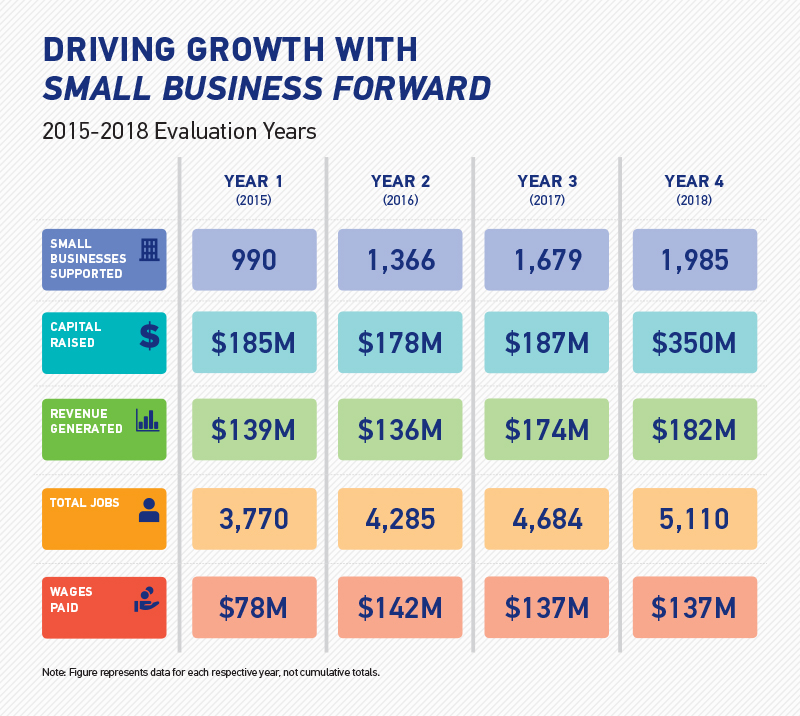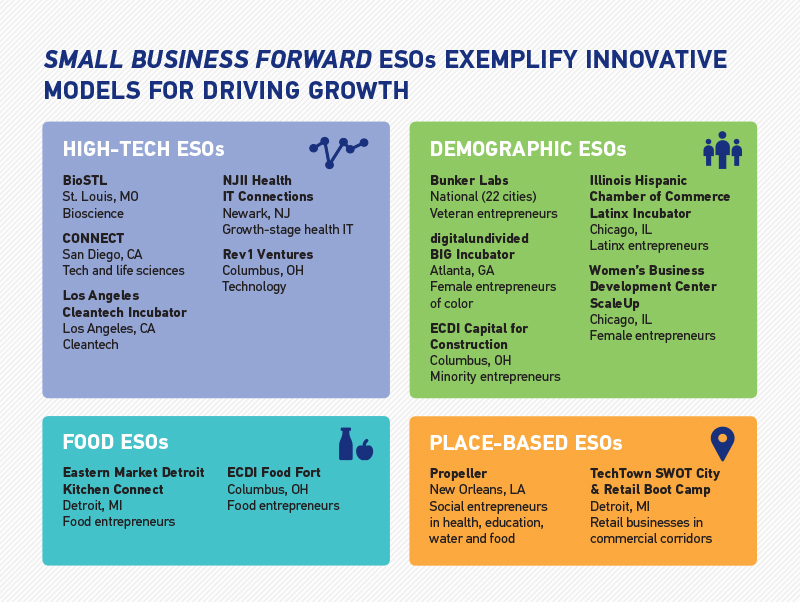Back

Blog
Organizations Creating Economic Opportunity by Supporting Diverse Entrepreneurs
Written by Ted Archer, JPMorgan Chase and Kim Zeuli, ICIC
As part of its Small Business Forward initiative, JPMorgan Chase supports women, minority and veteran-owned small businesses by investing in a dynamic cohort of entrepreneurial support organizations (ESOs). In its first four years, Small Business Forward has partnered with 19 ESOs to support over 6,000 small businesses that are creating local, inclusive economic growth. The ESOs provide entrepreneurs with critical business education and connections to capital to create more jobs.
In aggregate, across the four years, these businesses have raised $900 million in capital, generated over $631 million in revenue, employed 17,849 people and paid $494 million in wages.

2018 Impact
Since 2014, ICIC has been proud to serve as a partner of Small Business Forward, annually measuring and analyzing the performance and impact of this group of ESOs. An earlier blog summarizes our comprehensive approach to this evaluation, which includes an independent, annual survey of all businesses currently and previously supported by the ESOs.
In 2018, we evaluated 14 ESOs supporting nearly 2,000 businesses that raised $350 million in capital, generated $182 million in revenue, employed over 5,000 people (including 28 percent local hires), and paid $137 million in wages. Nearly one-third of the businesses they supported were owned by women and one-third were owned by minorities.
The remainder of this blog highlights the broader impact of the diverse ESOs supported by Small Business Forward. Each ESO is strengthening the entrepreneurial ecosystems in their cities, especially for underrepresented entrepreneurs.

Building Stronger, More Diverse High-Tech Clusters
Focusing on a particular cluster or industry can help an ESO maximize its impact. Cluster-based small business growth tends to deliver outsized job growth, and sector-specific ESOs provide businesses access to tailored, powerful networks and help them access targeted capital.
Located in St. Louis, BioSTL was created to support the growth of the biosciences cluster by addressing an important gap in the cluster: local bioscience start-ups. In its first decade, BioSTL focused on building entrepreneurial innovation assets (e.g., an incubator and research park) and new company creation. BioSTL now leverages these assets to help their start-ups grow and for capital, talent, and corporate attraction. It is also turning to another gap in the cluster: diversity of entrepreneurs. To address this gap, BioSTL has launched both the Bioscience & Entrepreneurial Inclusion Initiative, a stream of programming that provides underrepresented professionals in the biosciences with entrepreneurial training and network connections, and the St. Louis’ Equity in Entrepreneurship Collective, a collaboration of partners working at a regional ecosystem level to address issues of race and gender equity in early-stage, tech-based entrepreneurship.
Like BioSTL, CONNECT was established to strengthen high-tech and life sciences clusters in the region by developing more local start-ups. Located in San Diego, and one of the first startup accelerators in the U.S., CONNECT’s flagship program is Springboard, an individualized program leveraging the organization’s broad network of mentors with business, marketing and finance expertise, as well as experienced entrepreneurs to guide startups. CONNECT’s cluster impact also extends to workforce development, through its CONNECT Talent Match program, which helps businesses source candidates for hard-to-hire positions. CONNECT continues to develop new strategies to attract more diverse entrepreneurs. Its partnership with the City of San Diego and the Jacobs Center for Neighborhood Innovation, CONNECT ALL @ the Jacobs Center, is a new business accelerator aimed at growing local, early-stage businesses in the city’s historically-underserved Diamond neighborhood of southeastern San Diego.
The Los Angeles Cleantech Incubator (LACI) is a private nonprofit organization creating an inclusive green economy by unlocking innovation (through working with startups to accelerate the commercialization of clean technologies), transforming markets (through partnerships in transportation, energy and sustainable cities) and enhancing communities (through workforce development, pilots and other programs). LACI was founded as part of a cluster-driven economic development initiative by the City of Los Angeles and its Department of Water & Power. LACI incubates a portfolio of cleantech companies and provides them with flexible space (including an Advanced Protyping Center), business education, mentoring, and connections to investors. To ensure that underrepresented groups are engaged at every cleantech stage, LACI established a Diversity in Entrepreneurship Advisory Council focused on accomplishing their organizational goals around diversity and inclusion.
The New Jersey Innovation Institute, part of the New Jersey Institute of Technology, is driving the growth of the health information technology (health IT) cluster in the Greater Newark region through its Health IT Connections cohort program. The program supports growth-stage health IT businesses with executive coaching, strategic matchmaking to customers and partners, and partner development through networking and matchmaking opportunities.
As the premier entrepreneurial hub in Columbus, Ohio, Rev1 Ventures has played a critical role in building a technology startup ecosystem in its region. Rev1 currently manages $90 million in investments through its investor startup studio, connecting its portfolio of companies to advisors, vetted service partners, first customers and corporate strategic partners. Rev1 also operates an innovation center, Rev1 Labs, which currently houses more than 50 companies. Rev1 Ventures was recently named the fourth most active seed investor in the U.S. by Crunchbase.
Creating Economic Opportunity in the Food Sector
Food clusters play an important role in driving economic growth in distressed, low-income communities. They provide accessible jobs for local residents and, with support from ESOs, accessible wealth-building opportunities for local entrepreneurs.
Through its Detroit Kitchen Connect program, Eastern Market supports food entrepreneurs by providing access to licensed kitchen facilities, training on food regulations and licensing, as well as connecting them to new customers at Eastern Market’s popular weekly food markets. Eastern Market is also now partnering to redevelop several buildings in the district as accelerators for growing food companies. This includes FEAST Detroit, a co-packing accelerator facility located in nearby Inkster, where early-stage companies can expand quickly and meet surging demand by partnering with another company to process and package food.
ECDI’s Food Fort program supports food entrepreneurs in Columbus, Ohio. The Food Fort operates commercial kitchen space and commissary space for mobile food vendors, and offers training and technical assistance on food business-related topics, marketing and sales, procurement opportunities, and certification courses. The Food Fort is located in a food desert and works to help connect businesses to potential employees in the neighborhood in which it is located.
Backing Underrepresented Entrepreneurs
A growing number of ESOs are being established to serve underrepresented entrepreneurs (women, people of color and veterans), who have historically been an afterthought for many ESOs. These ESOs provide the dedicated spaces to make underrepresented entrepreneurs feel welcome and cohort programs to create peer communities of entrepreneurs who may experience similar challenges. Many entrepreneurs of color, for example, may be the first in their family or community to pursue an entrepreneurial venture. In addition to providing this community for underrepresented entrepreneurs, effective demographic-focused ESOs also deliver tailored business education and resources to help address the additional challenges underrepresented entrepreneurs face in growing their businesses.
Bunker Labs is a national nonprofit organization built by military veteran entrepreneurs to empower other military veterans to start and grow businesses by providing entrepreneurial programming, mentors, events, and thriving local communities to help veterans, transitioning service members, and military spouses succeed as entrepreneurs. Bunker Labs is currently operating in 22 cities, with plans to expand to all 50 states over the next several years. Rather than replicating existing resources, Bunker Labs builds strategic local partnerships and refers its entrepreneurs to additional resources and technical assistance as needed. It also provides innovative programming, such as Launch Lab Online, which is an interactive entrepreneurial education and networking platform that allows entrepreneurs in the ideation stage to pursue self-paced training and connect with each other around the world.
digitalundivided’s national BIG Incubator program opens doors into the innovation economy for women of color. The BIG Incubator cohort selects participants from their START program, an intensive weekend dedicated to ideation, pitching, feedback, and networking. The BIG Incubator is designed to not only equip entrepreneurs with technical education and training through its lean start-up curriculum, but it also has a particular focus on building the self-assurance and resilience of its founders through its Confident Founders curriculum.
Through a partnership with 1871, an entrepreneurial hub in Chicago, the Illinois Hispanic Chamber of Commerce (IHCC) manages the Latinx Incubator program, a 12-week cohort program for Latinx founders to help scale an existing tech product or service and make their business investment-ready. In addition to tailored educational programming and technical assistance, founders get access to mentorship from 1871 and IHCC, industry experts, local and national media exposure, and free co-working space.
The Women’s Business Development Center (WBDC) is a Chicago-headquartered economic development organization that supports business development and growth for diverse business owners, with a focus on women. ScaleUp is an intensive eight-week program delivering business and financial education and technical assistance to established businesses with high-growth potential in various low- to moderate-income communities. The WBDC partners with community-based organizations to host each program and recruit participants. ScaleUp participants also can take advantage of the broad range of additional entrepreneurial programs and services offered by the WBDC for each stage of the business life-cycle, including one-on-one advising, debt and equity placement, direct lending, Women’s Business Enterprise certification, capacity building, and corporate and public sector procurement opportunities.
ECDI’s Capital for Construction program was designed to help minority entrepreneurs access contracting opportunities created by the construction boom in Columbus, Ohio. Minority contractors have access to low-interest loans from ECDI to help bridge long gaps between the start of construction work and payment. Additionally, the program offers industry-specific training and mentorship.
Catalyzing Growth in Communities that Need it Most
Some Small Business Forward ESOs have played a critical role in the revitalization of their communities in the wake of significant environmental and economic upheavals.
In New Orleans, Propeller supports social entrepreneurs tackling social and environmental disparities in health, education, water, food, and economic justice. Propeller’s vision is to build a critical mass of entrepreneurs and key stakeholders working to build a more equitable future by addressing economic inequality and racial disparities. In 2017, the organization launched the South Broad Business Initiative, a business assistance program designed to provide business owners of color with free workspace, mentorship, and comprehensive technical support in the neighborhoods surrounding Propeller’s location. Businesses also are eligible to access below-market loans of up to $100,000 through Propeller’s Social Venture Fund.
TechTown, an incubator, accelerator and entrepreneurial hub in Detroit, was initially focused on helping tech startups as a strategy for creating greater economic opportunity in the city. To increase its impact and ensure local, small businesses had access to the same level of support, TechTown launched its BLOCKS programming aimed at growing and sustaining retail businesses in Detroit neighborhoods. Programming includes Retail Boot Camp, an intensive, eight-week course to help entrepreneurs launch brick-and-mortar businesses in core commercial districts, and SWOT City, an individualized coaching and action planning process for established businesses.
Building on Success
A vibrant and inclusive entrepreneurial ecosystem must include ESOs that intentionally support a diverse group of entrepreneurs in diverse sectors. The $150 million JPMorgan Chase is investing in Small Business Forward, including support for such ESOs, demonstrates the impact that one such coordinated investment can have on creating more economic opportunity.
